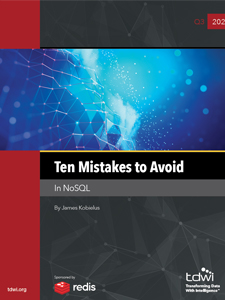
Ten Mistakes to Avoid in NoSQL
September 27, 2021
Over the past 20 years, this segment of the data platform market has grown to support a variety of requirements including big data analytics, unstructured data sources, low-latency web interactivity, application interconnectivity, data streaming, caching, time-series analysis, and behavioral graph analysis.
However, NoSQL platforms are application stores for specific use cases, not enterprise data repositories for every application. Most NoSQL feature sets are designed to meet the demands of online applications, such as personalization, online catalogs, mobile-first applications, and fraud detection. Likewise, NoSQL data platforms are not a full substitute for relational databases in handling strongly guaranteed atomic, consistent, independent, durable (ACID) transactions. Instead, NoSQL platforms tend to compromise consistency in favor of scalability, availability, partition tolerance, and speed.
This TDWI report identifies the chief mistakes enterprise IT and data managers often make with deployment and operation of these platforms and explains how you can avoid these mistakes in your own NoSQL initiatives.